Bourke Ulick J. Aryan Origin of the Gaelic Race and Language
Подождите немного. Документ загружается.

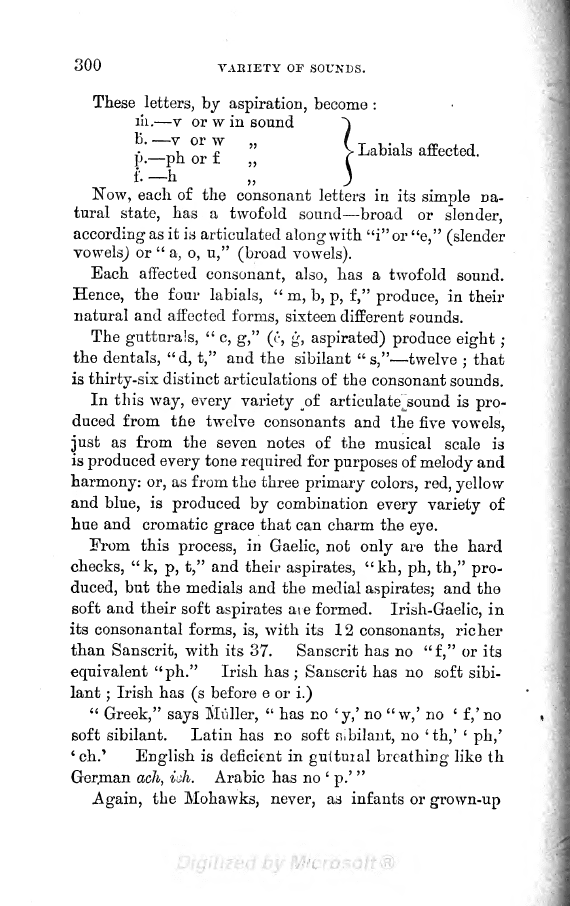
300
VARIETY OF
SOUNDS.
These
letters,
by
aspiration,
become
:
in.
v or w in
sound ~\
b.
v or
w
/
T .,
.
n
p.-phorf ,1
V
Labials
affected.
f.
h
3
Now,
each
of
the
consonant
letters in
its
simple
na-
tural
state,
has a
twofold
sound
broad
or
slender,
according
as
it
is
articulated
along
with "i"
or
"e,"
(slender
vowelsj
or
"
a
;
o, u,"
(broad
vowels).
Each affected
consonant,
also,
has a
twofold
sound.
Hence,
the four
labials,
"
m,
b,
p,
f,"
produce,
in
their
natural
and
affected
forms,
sixteen
different
pounds.
The
gutturals,
"
c,
g,"
(c, g,
aspirated)
produce
eight
the
dentals,
"d,
t,"
and the
sibilant
"
s,"
twelve
j
that
is
thirty-six
distinct
articulations of the
consonant
sounds.
In this
way, every
variety
u
of
articulate^sound
is
pro-
duced
from the
twelve
consonants and
the
five
vowels,
just
as from
the
seven notes
of
the
musical
scale is
is
produced
every
tone
required
for
purposes
of
melody
and
harmony:
or,
as
from
the
three
primary
colors, red,
yellow
and
blue,
is
produced
by
combination
every
variety
of
hue
and
cromatic
grace
that can
charm the
eye.
From
this
process,
in
Gaelic,
not
only
are the
hard
checks, "k,
p,
t,"
and
their
aspirates,
"kh,
ph,
th,"
pro-
duced,
but the
medials and the medial
aspirates;
and the
soft
and
their
soft
aspirates
at e
formed.
Irish-Gaelic,
in
its
consonantal
forms,
is,
with its
12
consonants,
richer
than
Sanscrit,
with
its
37.
Sanscrit
has no
"f,"
or
its
equivalent
"ph."
Irish
has
;
Sanscrit
has no
soft
sibi-
lant
;
Irish has
(s
before
e
or
i.)
"
Greek,"
says
Muller,
"
has no
'y,'
no
"
w,'
no
'
f,'
no
soft sibilant.
Latin has no
soft
nibilant,
no
'th,'
'
ph,'
'
ch.'
English
is
deficient
in
guttural
breathing
like
th
German
ach,
iuh. Arabic has no
'
p.'
"
Again,
the
Mohawks, never,
as
infants or
grown-up
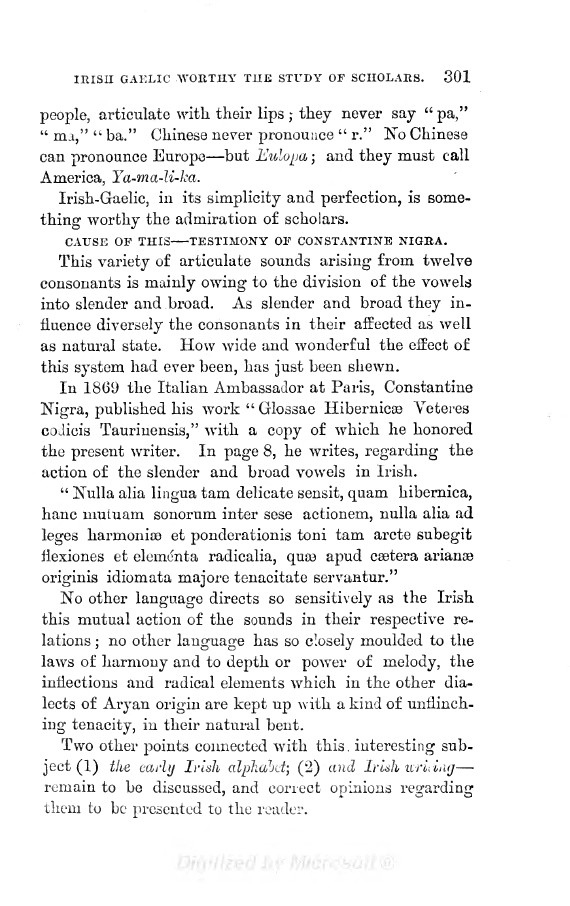
IRISH GAELIC
WORTHY
THE STUDY
OF SCHOLARS.
301
people,
articulate
with
their
lips
;
they
never
say
"
pa,"
"
ma,"
"
ba."
Chinese
never
pronounce
"
r." No Chinese
can
pronounce
Europe
but
Eulopa
;
and
they
must call
America,
Ya-ma-li-ka.
Irish-Gaelic,
in its
simplicity
and
perfection,
is some-
thing
worthy
the
admiration
of
scholars.
CAUSE OF
THIS
TESTIMONY OF CONSTANTINE
NIGRA.
This
variety
of articulate
sounds
arising
from
twelve
consonants
is
mainly owing
to the
division
of the
vowels
into
slender
and .broad. As slender
and broad
they
in-
fluence
diversely
the
consonants
in their
affected as
well
as natural state.
How
wide
and wonderful
the effect
of
this
system
had
ever
been,
has
just
been shewn.
In 1869
the
Italian
Ambassador
at
Paris,
Constantino
Nigra,
published
his work
"
Glossae
Hibernicse
Veteres
coiiicis
Taurinensis,"
with
a
copy
of which
he honored
the
present
writer. In
page
8,
he
writes,
regarding
the
action
of the slender and broad vowels
in Irish.
"
Nulla
alia
lingua
tarn delicate
sensit,
quam
hibernica,
hanc
niutuam
sonorum
inter sese
actionem,
nulla
alia
ad
leges
harmonice et
ponderationis
toni tarn
arete
subegit
flexiones
et
elemcnta
radicalia,
quse
apud
csetera
arianae
originis
idiom
ata
majore
tenacitate servantur."
No other
language
directs
so
sensitively
as
the Irish
this
mutual action of
the sounds
in their
respective
re-
lations
;
no other
language
has so
closely
moulded to the
laws
of
harmony
and to
depth
or
power
of
melody,
the
inflections and
radical elements which
in
the other
dia-
lects of
Aryan origin
are
kept
up
with a
kind
of
unflinch-
ing
tenacity,
in
their natural
bent.
Two
other
points
connected
with
this,
interesting
sub-
ject
(1)
the
early
Irish
alphabet-,
(2)
and Irish
urging
remain
to be
discussed,
and
correct
opinions regarding
them to
be
presented
to
the reader.
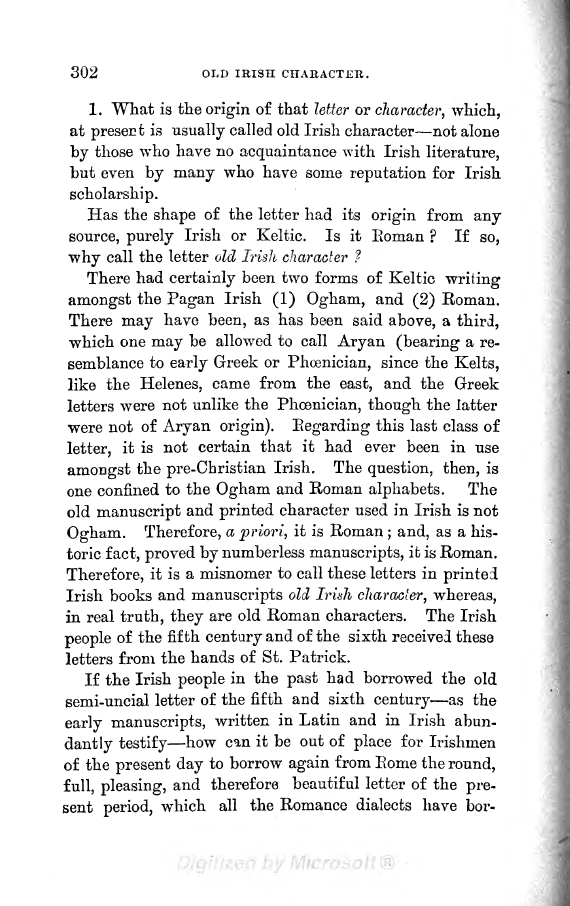
302
OLD
IRISH
CHARACTER.
1.
What
is the
origin
of that
letter or
character,
which,
at
presort
is
usually
called
old Irish
character
not
alone
by
those
who have
no
acquaintance
with
Irish
literature,
but
even
by many
who
have
some
reputation
for
Irish
scholarship.
Has
the
shape
of the
letter
had its
origin
from
any
source,
purely
Irish or
Keltic.
Is
it
Eoman
?
If
so,
why
call
the
letter old Irish
character ?
There
had
certainly
been
two
forms of
Keltic
writing
amongst
the
Pagan
Irish
(1)
Ogham,
and
(2)
Roman.
There
may
have
been,
as has
been
said
above,
a
third,
which
one
may
be
allowed
to
call
Aryan
(bearing
a re-
semblance
to
early
Greek
or
Phoenician,
since
the
Kelts,
like
the
Helenes,
came
from
the
east,
and
the
Greek
letters
were
not
unlike
the
Phoenician,
though
the
latter
were
not
of
Aryan
origin). Eegarding
this last
class
of
letter,
it is
not
certain
that it
had ever
been
in. use
amongst
the
pre-Christian
Irish.
The
question,
then,
is
one
confined
to
the
Ogham
and Roman
alphabets.
The
old
manuscript
and
printed
character used
in
Irish
is
not
Ogham.
Therefore,
a
priori,
it
is Roman
; and,
as a
his-
toric
fact,
proved
by
numberless
manuscripts,
it
is
Roman.
Therefore,
it is
a misnomer
to call these
letters
in
printed
Irish
books
and
manuscripts
old Irish
character,
whereas,
in real
truth,
they
are
old Roman
characters.
The
Irish
people
of
the
fifth
century
and of the
sixth
receive!
these
letters
from
the
hands
of St. Patrick.
If
the
Irish
people
in
the
past
had
borrowed
the
old
semi-uncial
letter
of
the
fifth and sixth
century
as
the
early
manuscripts,
written
in Latin and in
Irish
abun-
dantly
testify
how
can
it be
out of
place
for
Irishmen
of
the
present
day
to
borrow
again
from
Rome
the
round,
full,
pleasing,
and
therefore
beautiful letter
of
the
pre-
sent
period,
which
all
the
Romance dialects
have
bor-
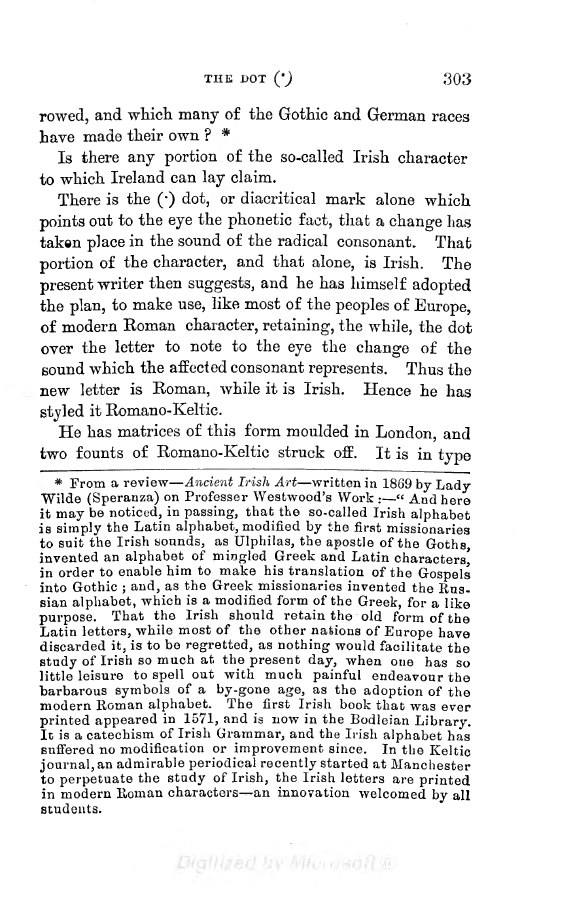
THE DOT
(')
303
rowed,
and which,
many
of
the
Gothic and
German
races
have
made
their
own ?
*
Is
there
any portion
of
the
so-called
Irish
character
to
which
Ireland
can
lay
claim.
There
is
the
()
dot,
or diacritical
mark
alone
which
points
out
to
the
eye
the
phonetic
fact,
that
a
change
has
taken
place
in
the sound
of the
radical
consonant.
That
portion
of
the
character,
and that
alone,
is
Irish.
The
present
writer
then
suggests,
and he
has
himself
adopted
the
plan,
to
make
use,
like
most of
the
peoples
of
Europe,
of
modern
Roman
character,
retaining,
the
while,
the
dot
over
the
letter
to
note to the
eye
the
change
of
the
sound
which
the
affected consonant
represents.
Thus
the
new
letter
is
Roman,
while it
is
Irish.
Hence
he
has
styled
it
Romano-Keltic.
He
has
matrices
of this form
moulded in
London,
and
two
founts
of
Romano-Keltic
struck
off.
It
is
in
type
*
From
a
review
Ancient Irish
Art
written
in
1869
by
Lady
Wilde
(Speranza)
on
Professer
Westwood's
Work
:
"
And
here
it
may
be
noticed,
in
passing,
that the
so-called
Irish
alphabet
is
simply
the
Latin
alphabet,
modified
by
the
first
missionaries
to
suit
the
Irish
sounds,
as
Ulphilas,
the
apostle
of
the
Goths,
invented
an
alphabet
of
miogled
Greek
and
Latin
characters^
in
order
to
enable
him
to make his
translation
of
the
Gospels
into
Gothic
;
and,
as
the
Greek
missionaries
invented
the
Rus-
sian
alphabet,
which
is a
modified form of
the
Greek,
for
a
like
purpose.
That
the
Irish should
retain
the
old
form
of
the
Latin
letters,
while
most of
the other
nations of
Europe
have
discarded
it,
is to
be
regretted,
as
nothing
would
facilitate
the
study
of
Irish
so
much
at
the
present
day,
when
one
has
so
little
leisure
to
spell
out with
much
painful
endeavour
the
barbarous
symbols
of a
by-gone
age,
as
the
adoption
of
the
modern
Roman
alphabet.
The first Irish
book
that
was
ever
printed
appeared
in
1571,
and
is
now in
the
Bodleian
Library.
It
is
a
catechism
of
Irish
Grammar,
and
the
Irish
alphabet
has
suffered
no
modification
or
improvement
since. In
the
Keltic
journal,
an
admirable
periodical
recently
started
at
Manchester
to
perpetuate
the
study
of
Irish,
the
Irish
letters
are
printed
in
modern Roman
characters an innovation
welcomed
by
all
students.
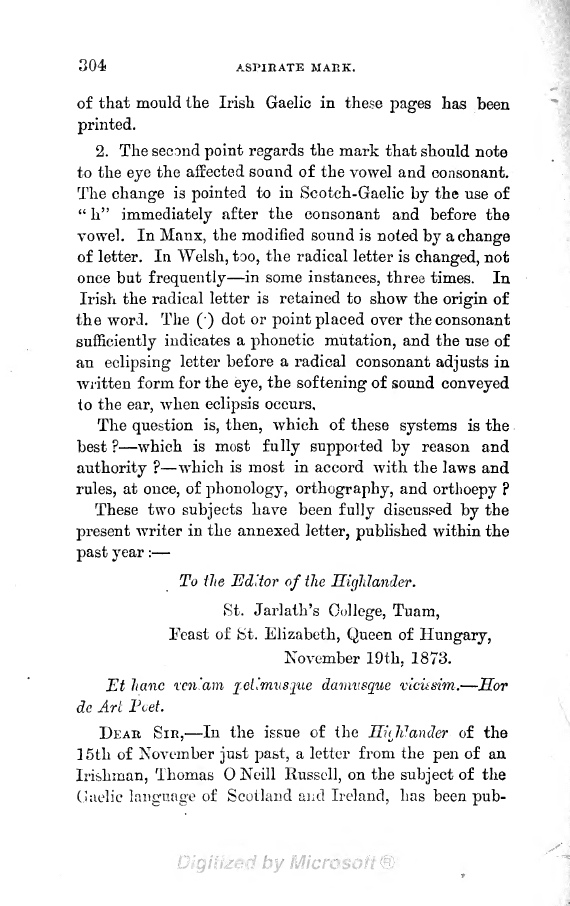
304
ASPIRATE MARK.
of that
mould the Irish
Gaelic
in
these
pages
has
been
printed.
2.
The
second
point regards
the
mark that
should
note
to the
eye
the
affected sound
of
the
vowel
and
consonant.
The
change
is
pointed
to
in
Scotch-Gaelic
by
the
use
of
"
h"
immediately
after
the
consonant
and
before the
vowel.
In
Manx,
the modified sound
is
noted
by
a
change
of
letter.
In
Welsh, too,
the
radical letter
is
changed,
not
once but
frequently
in
some
instances,
three
times.
In
Irish
the radical
letter
is retained
to
show
the
origin
of
the word.
The
()
dot or
point
placed
over
the
consonant
sufficiently
indicates
a
phonetic
mutation,
and the
use
of
an
eclipsing
letter before
a
radical
consonant
adjusts
in
written
form for
the
eye,
the
softening
of
sound
conveyed
to
the
ear,
when
eclipsis
occurs.
The
question
is,
then,
which of
these
systems
is the
best
?
which
is
most
fully
supported
by
reason and
authority
?
which
is most
in
accord with
the
laws and
rules,
at
once,
of
phonology,
orthography,
and
orthoepy
?
These
two
subjects
have
been
fully
discussed
by
the
present
writer in the annexed
letter,
published
within the
past year
:
To the Editor
of
the
Highlander.
St. Jarlath's
College,
Tuam,
Feast
of
St.
Elizabeth,
Queen
of
Hungary,
November
19th,
1873.
Et
lianc
I'cn'am
felimusgue
dannisque
vicusim.
HOT
de
Art
Poet.
DEAR,
SIR,
In
the issue
of the Hirh
7
ancler. of the
15th
of
November
just
past,
a
letter from
the
pen
of
an
Irishman,
Thomas O
Ncill
Russell,
on
the
subject
of the
Gaelic
language
of
Scotland
and
Ireland,
has been
pub-
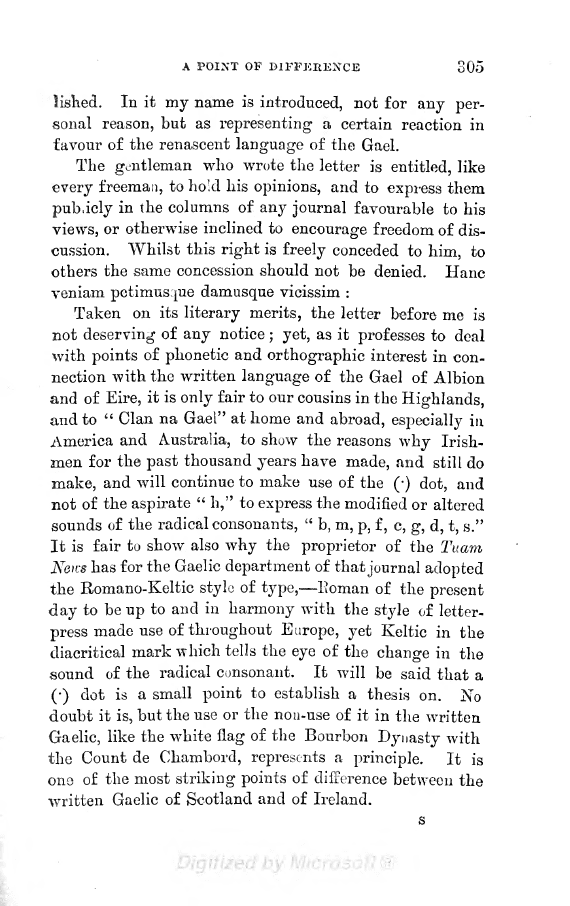
A POINT OF
DIFFERENCE
305
lished.
In it
my
name
is
introduced,
not for
any per-
sonal
reason,
but as
representing
a
certain
reaction in
favour
of
the renascent
language
of
the
Gael.
The
gentleman
who
wrote
the
letter
is
entitled,
like
every
freeman,
to
hold
his
opinions,
and
to
express
them
publicly
in the
columns of
any
journal
favourable to
his
views,
or
otherwise
inclined to
encourage
freedom
of
dis-
cussion.
Whilst
this
right
is
freely
conceded
to
him,
to
others
the same
concession
should
not
be
denied.
Haric
veniam
petimus^ue
damusque
vicissim
:
Taken
on
its
literary
merits,
the
letter
before
me is
not
deserving
of
any
notice
;
yet,
as
it
professes
to
deal
with
points
of
phonetic
and
orthographic
interest in
con-
nection
with
the written
language
of
the
Gael
of
Albion
and of
Eire,
it is
only
fair
to our
cousins in
the
Highlands,
and
to
"
Clan
na Gael"
at
home
and
abroad,
especially
in
America
and
Australia,
to
show
the
reasons
why
Irish-
men
for
the
past
thousand
years
have
made,
and
still
do
make,
and
will continue
to make
use of
the
()
dot,
and
not
of
the
aspirate
"
h,"
to
express
the
modified
or
altered
sounds
of
the
radical
consonants,
"
b,
m,
p,
f, c,
g,
d, t,
s."
It
is
fair
to show
also
why
the
proprietor
of
the
Tuam
News
has
for
the Gaelic
department
of
that
journal
adopted
the
Romano-Keltic
style
of
type,
Eoman
of
the
present
day
to
be
up
to
and
in
harmony
with
the
style
of
letter-
press
made
use
of
throughout
Europe,
yet
Keltic in
the
diacritical
mark
which
tells
the
eye
of
the
change
in
the
sound
of
the
radical
consonant.
It
will
be
said
that
a
()
dot
is
a small
point
to
establish
a
thesis
on.
No
doubt
it
is,
but
the
use
or the
non-use
of
it
in
the
written
Gaelic,
like
the
white
flag
of the
Bourbon
Dynasty
with
the
Count
de
Chambord,
represents
a
principle.
It
is
one
of
the
most
striking
points
of
difference
between
the
written
Gaelic
of
Scotland
and of
Ireland.
s
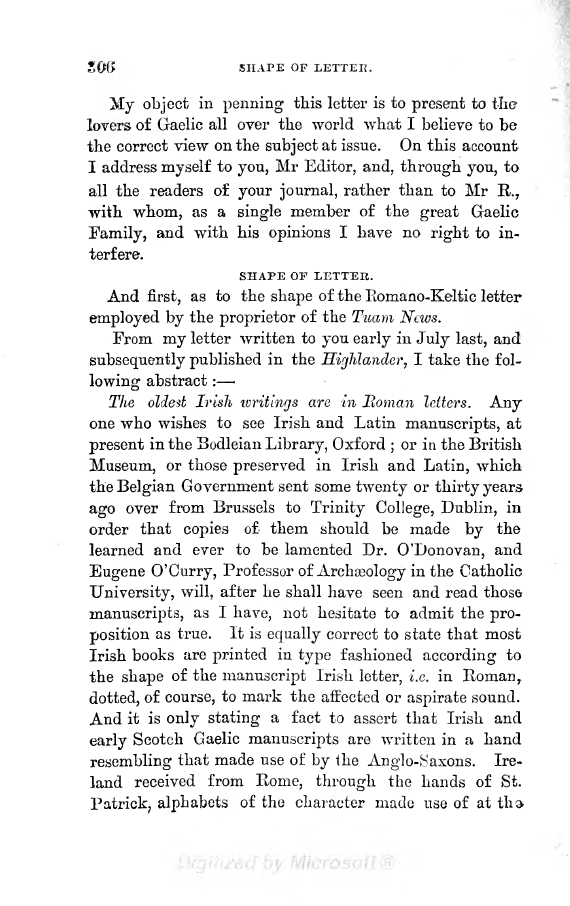
JOS
SHAPE
OF
LETTER.
My object
in
penning
this letter
is to
present
to
the
lovers
of Gaelic
all over the
world
what I
believe to be
the
correct
view
on the
subject
at issue. On this
account
I
address
myself
to
you,
Mr
Editor, and,
through you,
to
all the readers
of
your
journal,
rather than
to
Mr
R.,
with
whom,
as
a
single
member
of
the
great
Gaelic
Family,
and with his
opinions
I have
no
right
to
in-
terfere.
SHAPE
OF
LETTER.
And
first,
as to the
shape
of
the
Eomano-Keltic
letter
employed
by
the
proprietor
of the
Tuam
News.
From
my
letter written
to
you early
in
July
last,
and
subsequently published
in the
Highlander,
I
take
the fol-
lowing
abstract :
The
oldest
Irish
writings
arc in
Roman
letters.
Any
one
who
wishes
to
see Irish
and
Latin
manuscripts,
at
present
in the Bodleian
Library,
Oxford
;
or in the
British
Museum,
or those
preserved
in
Irish and
Latin,
which
the
Belgian
Government
sent
some
twenty
or
thirty
years-
ago
over
from Brussels
to
Trinity
College,
Dublin,
in
order
that
copies
of
them
should
be
made
by
the
learned
and ever
to be lamented
Dr.
O'Donovan,
and
Eugene
O'Curry,
Professor of
Archaeology
in
the Catholic
University,
will,
after
he
shall
have seen
and read those
manuscripts,
as I
have,
not
hesitate to admit
the
pro-
position
as
true. It is
equally
correct to
state
that most
Irish
books
are
printed
in
type
fashioned
according
to
the
shape
of
the
manuscript
Irish
letter,
i.e.
in
Roman,
dotted,
of
course,
to mark the
affected or
aspirate
sound.
And
it
is
only
stating
a
fact to
assert that Irish and
early
Scotch
Gaelic
manuscripts
are
written
in
a
hand
resembling
that made use
of
by
the
Anglo-Saxons.
Ire-
land
received
from
Rome,
through
the
hands
of St.
Patrick,
alphabets
of the
character
made
use
of
at tha
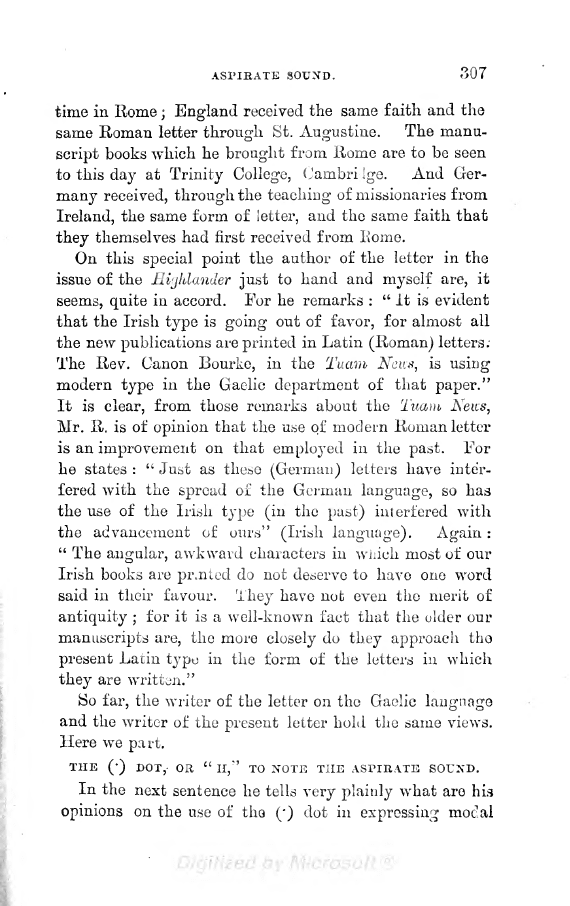
ASPIRATE SOUND.
307
time in
Rome
England
received
the
same
faith
and
the
same
Roman letter
through
St.
Augustine.
The
manu-
script
books which
he
brought
from
Rome are to be seen
to
this
day
at
Trinity
College,
Oainbri
ige.
Arid Ger-
many
received,
through
the
teaching
of
missionaries
from
Ireland,
the same form of
letter,
and
the same
faith that
they
themselves had first received
from Home.
On
this
special
point
the
author of
the
letter
in
tho
issue
of
the
Ei'jlilander
just
to
hand and
myself
are,
it
seems,
quite
in
accord.
For he remarks :
"It
is
evident
that
the
Irish
type
is
going
out of
favor,
for almost
all
the new
publications
are
printed
in Latin
(Roman)
letters;
The Rev. Canon
Bourke,
in the
Tit
am
Neus,
is
using
modern
type
in the
Gaelic
department
of
that
paper."
It is
clear,
from
those
remarks
about
the
Tuam
News,
Mr. R. is
of
opinion
that the use of modern
Roman
letter
is
an
improvement
on that
employed
in
the
past.
For
he states :
"
Just as
these
(German)
letters have
inter-
fered
with the
spread
of the German
language,
so has
the use
of the
Irish
type
(in
the
past)
interfered with
the advancement of
ours"
(Irish language). Again
:
"
The
angular,
awkward characters in
which
most
of our
Irish
books
are
printed
do not
deserve to
have
one word
said
in
their favour.
They
have not
even
the
merit
of
antiquity
;
for it
is a
well-known fact
that
the older our
manuscripts
are,
the more
closely
do
they
approach
tho
present
Latin
typo
in the form of the letters
in
which
they
are
written."
So
far,
the
writer
of the letter on the Gaelic
language
and
the
writer
of the
present
letter
hold
the
same views.
Here
we
part.
THE
(') DOT,
OR
"
H,"
TO NOTE THE ASPIRATE SOUND.
In
the
next
sentence he tells
very plainly
what
are
his
opinions
on
the
use
of
the
(')
dot
in
expressing
modal
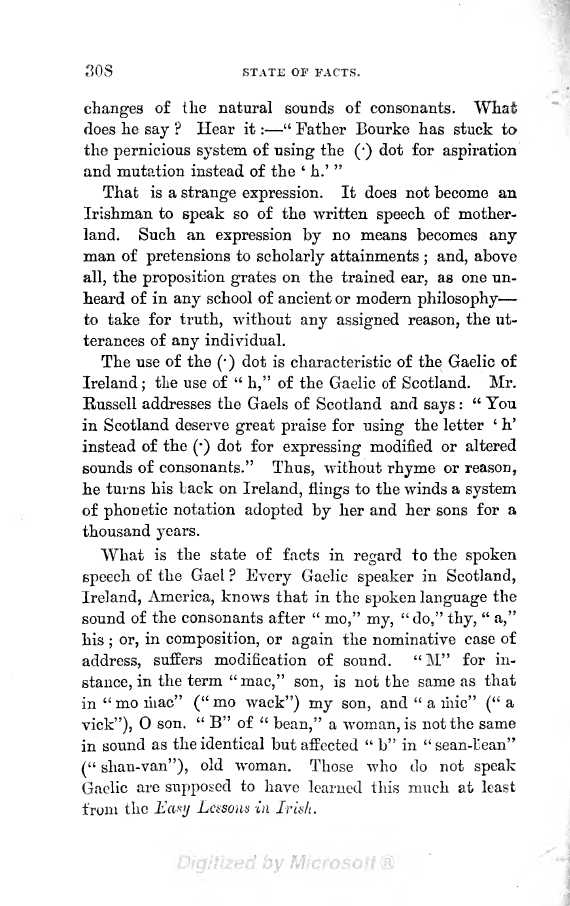
SOS
STATE
OF
FACTS.
changes
of
the natural
sounds
of
consonants. What
does he
say
?
Hear it :
"
Father Bourke
has stuck to
the
pernicious
system
of
using
the
()
dot
for
aspiration
and
mutation
instead of
the
'
h.'
"
That
is a
strange expression.
It does not become an
Irishman
to
speak
so
of
the
written
speech
of mother-
land.
Such an
expression by
no
means
becomes
any
man
of
pretensions
to
scholarly
attainments
; and,
above
all,
the
proposition
grates
on
the
trained
ear,
as
one un-
heard
of
in
any
school of
ancient or modern
philosophy
to take for
truth,
without
any assigned
reason,
the ut-
terances
of
any
individual.
The use
of the
()
dot
is
characteristic
of
the
Gaelic
of
Ireland
;
the
use
of
"
h,"
of the
Gaelic of Scotland.
Mr.
Russell
addresses the
Gaels of
Scotland
and
says
:
"
You
in
Scotland
deserve
great praise
for
using
the letter
'
h'
instead
of the
()
dot
for
expressing
modified
or
altered
sounds
of consonants."
Thus,
without
rhyme
or
reason,
he
turns
his
back on
Ireland,
flings
to the winds
a
system
of
phonetic
notation
adopted
by
her
and her
sons
for
a
thousand
years.
What
is
the state of
facts in
regard
to
the
spoken
speech
of
the Gael
?
Every
Gaelic
speaker
in
Scotland,
Ireland,
America,
knows that
in
the
spoken
language
the
sound
of
the
consonants
after
"
mo,"
my,
"do,"
thy,
"
a,"
his
;
or,
in
composition,
or
again
the nominative
case
of
address,
suffers modification
of
sound.
"
M"
for
in-
stance,
in
the
term
"mac,"
son,
is
not
the
same
as
that
in"moriiac"
("mo
wack")
my
son,
and
"
a mic"
("a
vick"),
son.
"
B"
of
"
bean,"
a
woman,
is
not
the
same
in
sound
as
the
identical
but
affected
"
b"
in
"sean-ljean"
("
shan-van"),
old
woman.
Those who do
not
speak
Gaelic
are
supposed
to
have
learned
this much
at least
from
the
Easy
Lessons -in
Irish.
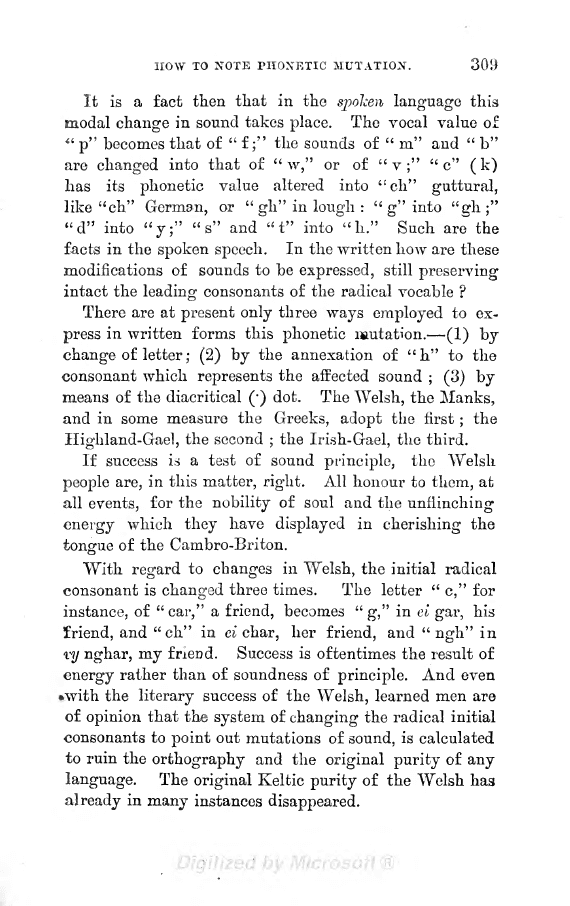
HOW
TO
NOTE PHONETIC MUTATIOX.
309
It
is
a
fact
then
that
in
the
spoken language
this
modal
change
in
sound
takes
place.
The vocal value of
*'
p"
becomes
that of
"
f
;"
the
sounds of
"
m" and
"
b"
are
changed
into
that
of
"
w,"
or
of
"
v
;"
"
c"
(
k)
lias
its
phonetic
value altered into
"ch"
guttural,
like "ch"
German,
or
"
gh"
in
lough
:
"
g"
into
"gh
;"
"d" into
"y;"
"
s"
and "t" into
"h."
Such
are
the
facts
in
the
spoken
speech.
In the
written how
are these
modifications
of
sounds
to
be
expressed,
still
preserving
intact
the
leading
consonants
of
the
radical
vocable
?
There are
at
present
only
three
ways
employed
to
ex-
press
in written
forms
this
phonetic
nautation.
(1) by
change
of
letter
;
(2)
by
the
annexation
of "h" to
the
consonant which
represents
the
affected sound
;
(3)
by
means of the diacritical
()
dot.
The
Welsh,
the
Manks,
and
in
some
measure the
Greeks,
adopt
the
first
;
the
Highland-Gael,
the second
;
the
Irish-Gael,
the
third.
If success
is a test
of
sound
principle,
the Welsh
people
are,
in
this
matter,
right.
All
honour to
them,
at
all
events,
for the
nobility
of soul
and
the
unflinching
energy
which
they
have
displayed
in
cherishing
the
tongue
of
the Cambro-Briton.
With
regard
to
changes
in
Welsh,
the initial
radical
consonant
is
changed
three times. The
letter
"
c,"
for
instance,
of
"car,"
a
friend,
becomes
"
g,"
in
ei
gar,
his
friend,
and
"ch" in
eschar,
her
friend,
and
"
ngh"
in
iij nghar, my
friend. Success is
oftentimes
the result
of
energy
rather than of
soundness of
principle.
And even
with the
literary
success
of
the
Welsh,
learned
men are
of
opinion
that the
system
of
changing
the radical
initial
consonants to
point
out
mutations of
sound,
is
calculated
to ruin
the
orthography
and
the
original
purity
of
any
language.
The
original
Keltic
purity
of the Welsh
has
already
in
many
instances
disappeared.
